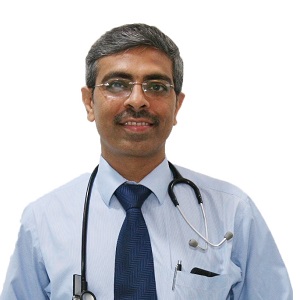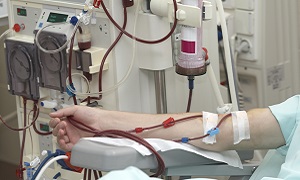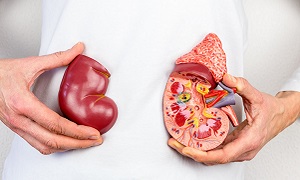Best Doctors in India for Glomerulonephritis Treatment
- Top Nephrologist | Apollo Hospital, New Delhi, India
- 20+ Years Experience
- Indraprastha Apollo Hospital, New Delhi
Profile Highlights:
- Dr. Gaurav Sagar is currently working as a consultant nephrologist at Apollo Indraprastha Hospital, New Delhi. He has over ten years of experience in renal medicine with a special interest in vascular access, kidney transplant, and critical care nephrology.
- Dr. Sagar has been a pioneer in practicing and promoting Interventional Nephrology in North India and was part of the team which conducted the first ABO-incompatible transplant in North India.
- Nephrologist, Chennai, India
- Over 43 years’ experience
- Apollo Hospitals Greams Road
Profile Highlights:
- Dr. Prakash K C is one of the senior Nephrologists from Tamil Nadu, with over 43 years of experience managing renal disorders.
- He provides consultation and a wide range of medical services like Ureteroscopy (URS), Kidney Transplant, Hemodialysis, etc. His team ensures a friendly environment for patients.
- Dr. Prakash is involved in many pieces of research and got his work published in periodicals and textbooks.
- Nephrologist, Chennai, India
- Over 29 years’ experience
- Apollo Hospitals Greams Road
Profile Highlights:
- Dr. B Subba Rao is one of the best Nephrologists in Tamil Nadu, with over 29 years of experience.
- Dr. Rao offers consultation and various services like Nephrolithotripsy, Hemodialysis, Hemodiafiltration (HDF), Percutaneous Nephrolithotripsy, CKD, Kidney Stone Treatment, Kidney Failure Treatment, etc.
- Dr. Subba Rao has been awarded the Vocational Excellence Award for his contributions to the field
- Nephrologist, Chennai, India
- Over 23 years’ experience
- Apollo Hospitals Greams Road
Profile Highlights:
- Dr. Rajeev Annigeri is a well-known Nephrologist from South India with 23 years of experience in the field of renal disorders treatment.
- He went under special training in Peritoneal Dialysis from the University of Missouri, USA.
- Dr. Annigeri ensures a fully supportive environment for the patients. The doctor provides many medical services like Adrenalectomy, Kidney Transplant, Hemodialysis, Kidney Surgery, Hemodialysis, etc.
- Nephrologist, Chennai, India
- Over 29 years’ experience
- Apollo Hospitals Greams Road
Profile Highlights:
- Dr. S Rajagopalan Seshadri is one of the best Nephrologists from Tamil Nadu, with over 29 years of experience.
- Dr. S Rajagopalan provides a wide range of medical services as a specialized Nephrologist/Renal Specialist.
- He is known for excellent patient care. Patients also visit Dr. Rajagopalan for other services like Proteinuria, Kidney Transplant, Hemodialysis, Nephrectomy, Percutaneous Nephrolithotripsy, CKD, Kidney Failure, etc.
- Nephrologist, Gurugram, India
- Over 20 years’ experience
- Manipal Hospitals, New Delhi
Profile Highlights:
- Dr. Suman Lata Nayak is one of Delhi’s most prominent Transplant physicians and was the founder of the Nephrology Department at the Institute of Liver and Biliary Sciences.
- Throughout her career, she has been actively involved in clinical research. Dr. Suman Lata Nayak’s research in the field of kidney transplantation, TB, and liver disease in patients, has made a significant impact on improving protocols in India.
Best Hospitals in India for Glomerulonephritis Treatment
Hospital Highlights:
- Apollo Hospitals is a private healthcare group in India, with its headquarters based in Chennai. Established in 1983 by Dr. Prathap C. Reddy, the group offers a wide range of medical treatments and services across various specialties.
- It is renowned for emphasizing innovation and utilizing cutting-edge medical technologies into patient treatment.
- Known as India’s first corporate hospital, Apollo Hospitals is often credited for pioneering the private healthcare revolution in the country.
- With clinics and hospitals located all throughout India, Apollo Hospitals is a nationwide healthcare organization. Its presence can also be found in foreign countries.
- Preventive health examinations, medical and surgical treatment, and diagnostic centres are just a few of the services that the Apollo group provides.
- The group has several centres of expertise, including Cardiac Sciences, Neurosciences, Orthopedics, Emergency Care, Cancer Care, and Organ Transplantation.
- City: Chennai, India
Hospital Highlights:
- RIMC is a multi-specialty hospital in a sprawling area of 36 acres located in Chromepet, Chennai, Tamil Nadu, India.
- The facility has 450 beds including 130 critical care beds, 9 operating rooms, modern reference laboratories and radiology services, and is conveniently located near road, rail and air transportation.
- RIMC is led and managed by world-renowned physicians committed to healthcare.
- RIMC offers the broadest range of clinical care, education, and research. The hospital offers state-of-the-art technology and modern treatment facilities designed to provide health care at an affordable cost.
- Rela Institute is driven by patient needs, comfort and confidence.
- City: New Delhi, India
Hospital Highlights:
- Fortis Hospital in Shalimar Bagh is a multi-super specialty hospital that strives to provide world-class patient care by leaving no stone unturned.
- Fortis, Shalimar Bagh, with 262 beds and a 7.34-acre footprint, provides the best level of medical care through its team of doctors, nurses, technicians, and management professionals.
- City: Bengaluru, India
Hospital Highlights:
- Established in 2007, the Apollo Hospitals Bangalore is a 300-bed multispecialty hospital situated in Bannerghatta Road, Bangalore.
- Equipped with the state-of-the-art technology, it is a leading hospital dedicated to providing healthcare needs to patients with compassion and expertise.
- It is the first hospital to have completed the highest number of Robot Assisted Heart Surgeries in India.
- Over the years, it has successfully conducted some of the rarest medical procedures such as spinal angiolipoma excision, autologous chondrocyte implantations, and tibial tuberosity shift with MPSL reconstruction.
- The Apollo Hospitals Bangalore has the reputation of performing the greatest series of airway stents in the country.
- Additionally, the hospital is known for providing comprehensive treatment in specialties such as gastroenterology, urology, gynecology, oncology, colorectal surgery, etc.
- The “The Minimal Access Surgery Centre” (MASC), one of Apollo Hospitals, Bangalore’s premier Centres of Excellence, is devoted to the use of minimally invasive surgical procedures.
- In 2013, THE WEEK-A C Nielsen, Best Hospital Survey ranked Apollo Hospitals Bangalore as the 2nd best multi-speciality hospital in Bangalore.
- City: Mumbai, India
Hospital Highlights:
- Gleneagles Global Hospital The 450-bed facility comprises of 17-stories, housing state-of-the-art infrastructure, and advanced medical care facilities.
- The hospital offers end-to-end clinical, surgical, and diagnostic services. It is equipped with a team of eminent medical professionals aided by qualified nurses and medical staff
- The Hospital offers advanced Endoscopic procedures, Hepatobiliary and Liver Surgeries, Surgical and Medical Gastroenterology, Bariatric Surgery, and Robotic surgery.
- The hospital is a center of excellence for Orthopedics, Joint Replacement, Knee Replacement, and Hip Replacement surgery.
- City: Hyderabad, India
Hospital Highlights:
- CARE Hospitals were established in the year 2000, by CARE Group.
- The multispecialty hospital has 435 beds, including 120 critical care beds, with an annual inflow of 180000 outpatients and 16,000 in-patients.
- The hospital provides specialty medical services in Cardiology, Cardiothoracic Surgery, Pediatric Cardiology, Pediatric Cardiothoracic Surgery, Neurology, Neurosurgery, Nephrology, and Urology.
- The hospital has the first dual source, 128 slice CT scanner (for high precision cardiac imaging) – the first of its kind in south India.
- The hospital offers a wide range of accommodation facilities for the convenience of its varied patient base, ranging from general wards to super deluxe rooms.
- City: Mumbai, India
Hospital Highlights:
- Fortis Hospital in Mulund is a 315-bed multi-speciality tertiary care hospital with five JCI accreditations that offers a wide variety of diagnostic and treatment services. The Fortis Hospital in Mulund delivers patient-centred treatment with cutting-edge technology, highly skilled and experienced surgeons, and paramedical staff.
- This institution houses Maharashtra’s largest multi-organ transplant centre. It is also the first heart transplant centre in western India to conduct 100 or more consecutive heart transplants in under four years. It is the only hospital in the city to have multi-organ transplants and has handled the youngest patient for angioplasty. Fortis Hospital Mulund now boasts the first advanced surgical robot in central Mumbai.
- Cardiology and heart surgery, urology, nephrology, neurosciences, orthopaedics, digestive care, emergency and critical care, and maternity care are among the services provided by the hospital.
- City: New Delhi, India
Hospital Highlights:
- Manipal Hospitals, Dwarka, is a super-specialty hospital in Dwarka, New Delhi, which is a part of Manipal Hospitals Group.
- The hospital aims to provide the best treatment on par with international standards at a fraction of the cost.
- Equipped with 380 beds, the hospital is also one of the new age hospitals which are equipped fully with state-of-the-art infrastructure, cutting-edge technology as well as the latest and advanced clinical practices. The hospital also has 13 modular Operation theatres with 118 beds which are solely meant for critical care.
- The hospital comprises internationally acclaimed doctors and highly professional and experienced hospital and medical staff who are able to provide preventive, therapeutic, and diagnostic services all under one roof.
- City: Chennai, India
Hospital Highlights:
- Located in Chennai, India, MGM Healthcare is a top multispecialty hospital that provides all medical services under one roof.
- Since its founding in 2019, MGM Healthcare has quickly become a leading national referral centre, creating several innovative flagship initiatives.
- MGM Healthcare combines next-generation medical and digital technologies to provide better patient results.
- With 12 centres of excellence, more than 400 inpatient beds, 100 intensive care unit beds, and 24/7 emergency care, MGM Healthcare leaves no chance in redefining the patient experience in Chennai.
- MGM Healthcare boasts 250+ expert doctors across 30+ departments, including Cardiology, Pulmonology, Neurology, Obstetrics & Gynaecology, and more.
- They house 12 specialized Centres of Excellence, including Neurosciences, Orthopaedics, and Multi-Organ Transplantation.
- Their team of doctors, nurses, and paramedics works together to give every patient individualized treatment.
Hospital Highlights:
- Lilavati Hospital & Research Centre is India’s premier multi-speciality tertiary care hospital and has been recognised as a global medical excellence centre.
- Lilavati Hospital & Research Centre has built an unrivalled level of trust with its patients over the years, thanks to a solid foundation that comprises cutting-edge facilities, the best medical competence, research, education, and charity endeavours.
- The hospital is quite proud of the fact that it now serves patients from all kinds of backgrounds, not just from the United States but from all around the world.
- The hospital has a total of 323 beds, one of the largest Intensive Care Units (ICUs), 12 Operation Theatres with modern amenities, over 300 consultants, and almost 1,800 personnel.
Glomerulonephritis
Glomerulonephritis is a condition where the tiny filters in your kidneys, i.e. glomeruli, get inflamed. Glomeruli help you to remove excess fluid and waste from your bloodstream, which is then passed into your urine. This condition can come on suddenly or develop gradually. Both types may be fatal.
Glomerulonephritis can occur on its own or sometimes it may be a complication of another disease such as diabetes or lupus. Your kidneys can get damaged if there is severe or prolonged inflammation caused by glomerulonephritis. Therefore, early diagnosis and treatments are quite important.
Symptoms
Symptoms that you experience usually depend on what type of glomerulonephritis you are having and the severity of the condition.
Symptoms of acute glomerulonephritis include the following:
- Puffiness in your face
- Extra fluid in your lungs, which can lead to coughing
- Urinating less often
- Blood in your urine
- High Blood Pressure
The chronic form of glomerulonephritis can sometimes occur without any symptoms. There might be slow development of symptoms that are similar to the acute form. Some of the symptoms include the following:
- Blood or excess protein in your urine, which may be microscopic and show up in urine tests
- High blood pressure
- Pain in the abdomen
- Frequent nosebleeds
- Swelling in your ankles and face
- Frequent nighttime urination
- Bubbly or foamy urine, caused by excess protein
In some cases, your glomerulonephritis might get so advanced that it can lead you to develop kidney failure. Some of the symptoms of this can include the following:
- Fatigue
- Lack of appetite
- Nausea and vomiting
- Insomnia
- Muscle cramps at night
- Dry and itchy skin
Causes
Several conditions can lead to glomerulonephritis. The disease is also sometimes known to run in families. In other cases, the disease may be unknown.
The following causes can lead to inflammation of the glomeruli:
Post-streptococcal glomerulonephritis- Glomerulonephritis can develop some days after you recover from a strep throat infection or, in rare cases, a skin infection. To combat the infection, your body is going to produce extra antibodies that may eventually settle in the glomeruli, and lead to inflammation.
This type of glomerulonephritis is more common among children than adults. But they are also likely to recover more quickly.
Bacterial endocarditis- Bacteria can spread occasionally through the bloodstream and lodge in your heart, leading to an infection of one or more of your heart valves. If you have a heart defect, such as a damaged or artificial heart valve, then you are at a greater risk. Bacterial endocarditis is associated with glomerular disease, though the connection between the two is still unclear.
Viral infections- There are several viral infections, such as the human immunodeficiency virus (HIV), hepatitis B, and hepatitis C, which can also cause glomerulonephritis.
Goodpasture’s syndrome- This is a rare immunological lung disorder that is similar to pneumonia. Goodpasture’s syndrome leads to bleeding in your lungs as well as glomerulonephritis.
Lupus- This is a chronic inflammatory disease, which can affect many parts of your body, such as your joints, skin, blood cells, heart, kidneys, and lungs.
IgA nephropathy- This condition is characterized by recurrent episodes of blood in the urine. This primary glomerular disease is a result of deposits of immunoglobulin A (IgA) in the glomeruli. IgA nephropathy can progress for years without any noticeable symptoms.
Polyarteritis- This is a form of vasculitis which affects small and medium blood vessels in several parts of your body, like your heart, kidneys, and intestines.
Granulomatosis with polyangiitis- This form of vasculitis, which is formerly known as Wegener’s granulomatosis, can affect small and medium blood vessels in your lungs, upper airways, and kidneys.
High blood pressure- High blood pressure can damage your kidneys and impair their ability to function normally. Glomerulonephritis can also lead to high blood pressure since it reduces kidney function and can also influence how your kidneys handle sodium.
Diabetic kidney disease (diabetic nephropathy)- This can affect anyone having diabetes, generally taking years to develop. Good control of blood sugar levels and blood pressure can however prevent or slow kidney damage.
Focal segmental glomerulosclerosis- This condition is characterized by scattered scarring of some of the glomeruli, and it can result from another disease or sometimes occur for no known reason.
Infrequently, chronic glomerulonephritis also runs in families. One inherited form, Alport syndrome, may impair one’s vision or hearing.
Glomerulonephritis is associated with certain cancers as well, such as multiple myeloma, lung cancer as well as chronic lymphocytic leukemia.
Diagnosis
Glomerulonephritis is often detected during a routine urine analysis. Tests to assess your kidney function and for diagnosis of glomerulonephritis can include:
Blood tests
Urine test
Imaging tests
If your doctor detects evidence of damage, he/she can recommend a kidney X-ray, a CT scan, or an ultrasound exam.
Kidney biopsy
Treatment
Treatment is going to depend on several factors such as whether the condition is acute or chronic, the underlying cause, as well as the severity of the symptoms.
Medication
Glomerulonephritis after a strep infection should generally clear up without any treatment, though your doctor might prescribe antibiotics to kill the pathogens that are causing the infections. However, the patient will also likely need to reduce the intake of fluids as well as avoid food and drinks containing alcohol or high levels of protein, potassium, or salt.
Dialysis
Kidney transplant
A kidney transplant can be possible if the individual is healthy. However, for people who cannot undergo a transplant, dialysis is the only option.
Complications
Glomerulonephritis can cause severe damage to your kidneys, making them lose their filtering ability. Some of the possible complications of glomerulonephritis include:
High blood pressure- Damage to your kidneys and the resulting buildup of wastes in your bloodstream may eventually cause your blood pressure to rise.
Acute kidney failure– Loss of function in the filtering part of the nephron can lead to rapid accumulation of waste products. Due to this, you might require emergency dialysis, which is an artificial means of removing extra fluids and waste from your blood, using an artificial kidney machine.
Chronic kidney disease– In this condition, your kidneys lose their filtering ability. Kidney function that deteriorates to below ten percent of normal capacity results in end-stage kidney disease, which can require dialysis or a kidney transplant to help sustain life.
Nephrotic syndrome- With this syndrome, too much protein in your urine causes too little protein in your blood. Nephrotic syndrome may be associated with high blood cholesterol as well as swelling of your eyelids, feet as well as the abdomen.
Prevention
Although most forms of glomerulonephritis are not preventable, there are some ways to reduce the risk.
Some of the ways include the following:
- Seek medical attention if you have a strep infection causing a sore throat or impetigo
- Practice safe sex
- If you have blood pressure or diabetes, keep it in control
- Avoid the use of illegal intravenous drug as well as sharing needles
A healthy lifestyle with proper exercise, proper sleep, and a balanced diet can also help in reducing the risk of glomerulonephritis.























